.
Along I-80 outside Reno, Pyramid Lake Indian Reservation, Washoe, Nevada: photo by Jonas Dovydenas (1939-) for the Environmental Protection Agency Project DOCUMERICA, June 1973 (US National Archives)
Who's looking out?
Who's out there
looking in from the road
on which the world is passing by,
always growing larger
stranger and richer
or poorer and less strange
always growing larger
stranger and richer
or poorer and less strange
or older and narrower
in the rearview, as you
catch yourself looking
catch yourself looking
always away, off to
one side?
Spring roundup of Paiute-owned cattle begins at Sutcliffe, Pyramid Lake Indian Reservation, Washoe, Nevada: photo by Jonas Dovydenas for the Environmental Protection Agency Project DOCUMERICA, June 1973 (US National Archives)
Spring roundup of Paiute-owned cattle begins at Sutcliffe, Pyramid Lake Indian Reservation, Washoe, Nevada: photo by Jonas Dovydenas for the Environmental Protection Agency Project DOCUMERICA, June 1973 (US National Archives)

Spring roundup of Paiute-owned cattle begins at Sutcliffe, Pyramid Lake Indian Reservation, Washoe, Nevada. Corralling and branding is done in five stages around Pyramid lake. Unbranded calves are allowed to seek their mothers. Then they are roped and branded: photo by Jonas Dovydenas for the Environmental Protection Agency Project DOCUMERICA, June 1973 (US National Archives)

Spring roundup of Paiute-owned cattle begins at Sutcliffe, Pyramid Lake Indian Reservation, Washoe, Nevada. Corralling and branding is done in five stages around Pyramid Lake. Roped calf: photo by Jonas Dovydenas for the Environmental Protection Agency Project DOCUMERICA, June 1973 (US National Archives)

Paiute Indian woman at the laundromat in Nixon, Pyramid Lake Indian Reservation, Washoe, Nevada: photo by Jonas Dovydenas for the Environmental Protection Agency Project DOCUMERICA, June 1973 (US National Archives)

Outdoor advertising seen from I-80, approaching Reno from the east: photo by Jonas Dovydenas for the Environmental Protection Agency Project DOCUMERICA, June 1973 (US National Archives)

On a Reno street: photo by Jonas Dovydenas for the Environmental Protection Agency Project DOCUMERICA, June 1973 (US National Archives)

Paiute Indian children outside grocery store in Nixon, Pyramid Lake Indian Reservation, Washoe, Nevada: photo by Jonas Dovydenas for the Environmental Protection Agency Project DOCUMERICA, May 1973 (US National Archives)
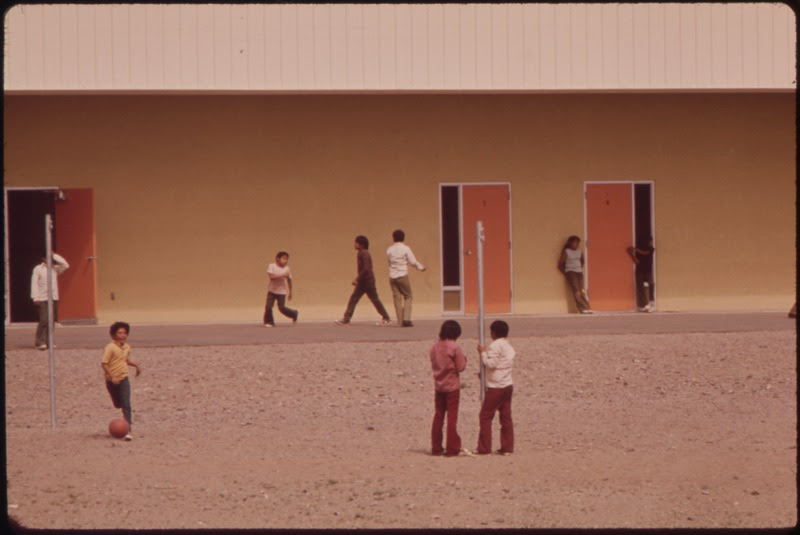
Paiute Indian children in schoolyard in Wadsworth, Pyramid Lake Indian Reservation, Washoe, Nevada: photo by Jonas Dovydenas (1939-) for the Environmental Protection Agency Project DOCUMERICA, May 1973 (US National Archives)

Nixon -- a small Paiute Indian settlement near the south end of Pyramid Lake, on the Pyramid Lake Indian Reservation: photo by Jonas Dovydenas for the Environmental Protection Agency Project DOCUMERICA, May 1973 (US National Archives)
Reno suburb: photo by Jonas Dovydenas for the Environmental Protection Agency Project DOCUMERICA, June 1973 (US National Archives)

Reno expanding to surrounding meadows off I-80. Continued growth strains the water supply and threatens Pyramid Lake: photo by Jonas Dovydenas for the Environmental Protection Agency Project DOCUMERICA, June 1973 (US National Archives)
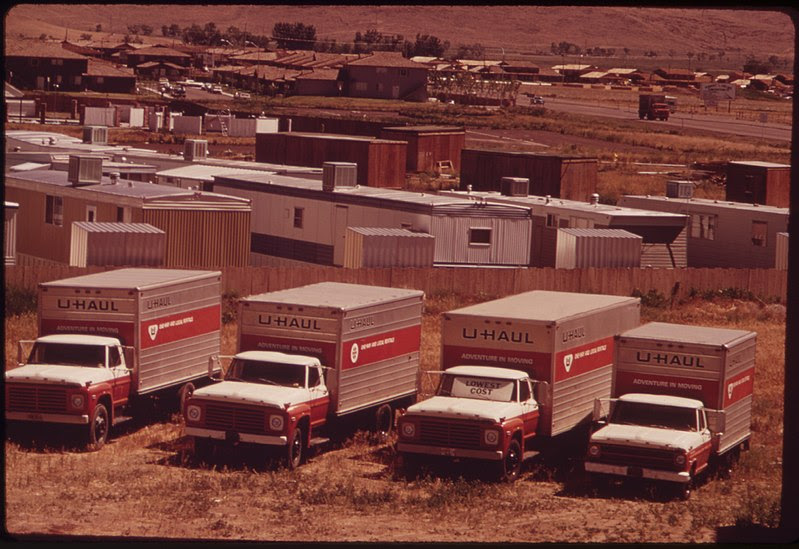
Along I-80, outside Reno. Continued growth strains the water supply and threatens Pyramid Lake: photo by Jonas Dovydenas for the Environmental Protection Agency Project DOCUMERICA, June 1973 (US National Archives)
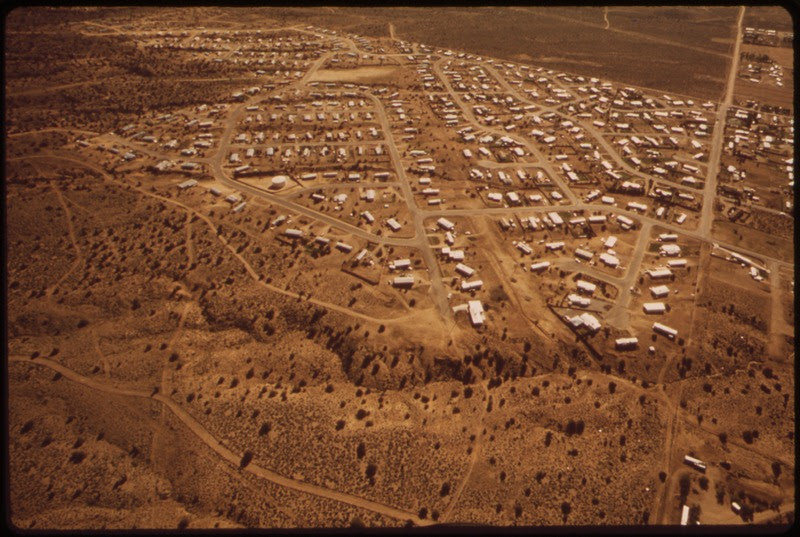
Urban sprawl outside Reno: photo by Jonas Dovydenas for the Environmental Protection Agency Project DOCUMERICA, June 1973 (US National Archives)

Entertainment round-the-clock is a Reno attraction: photo by Jonas Dovydenas for the Environmental Protection Agency Project DOCUMERICA, May 1973 (US National Archives)

Reno motel: photo by Jonas Dovydenas for the Environmental Protection Agency Project DOCUMERICA, May 1973 (US National Archives)
Signs on route 95 near Fernley, Nevada: photo by Jonas Dovydenas for the Environmental Protection Agency Project DOCUMERICA, May 1973 (US National Archives)

Pyramid Lake Beach on Memorial Day Weekend, Pyramid Lake Indian Reservation, Washoe, Nevada: photo by Jonas Dovydenas for the Environmental Protection Agency Project DOCUMERICA, May 1973 (US National Archives)

Avery Winnemucca is one of several Paiute Indians who run the dock at Sutcliffe's Landing, Pyramid Lake Indian Reservation: photo by Jonas Dovydenas for the Environmental Protection Agency Project DOCUMERICA, May 1973 (US National Archives)
Avery Winnemucca is one of several Paiute Indians who run the dock at Sutcliffe's Landing, Pyramid Lake Indian Reservation: photo by Jonas Dovydenas for the Environmental Protection Agency Project DOCUMERICA, May 1973 (US National Archives)

Floyd Flores and one of his children on his biannual visit to Nixon to lay flowers at his parents' graves, Pyramid Lake Indian Reservation: photo by Jonas Dovydenas for the Environmental Protection Agency Project DOCUMERICA, May 1973 (US National Archives)

Pyramid Lake, the largest natural lake in Nevada, lies within the Pyramid Lake Indian Reservation. The island for which the lake is named rises 475 feet abpve the surface of the water. It is called Fremont's Pyramid after Captain John Fremont, who named the lake. View shows desert setting for which the lake is noted: photo by Jonas Dovydenas for the Environmental Protection Agency Project DOCUMERICA, June 1973 (US National Archives)

The Pinnacles at Pyramid Lake, south side. Beyond are the Virginia Mountains: photo by Jonas Dovydenas for the Environmental Protection Agency Project DOCUMERICA, May 1973 (US National Archives)

Aerial view of campers on a beach at Pyramid Lake: photo by Jonas Dovydenas for the Environmental Protection Agency Project DOCUMERICA, May 1973 (US National Archives)

Algae growth in one of the shallow bays of Pyramid Lake, Nevada's largest natural lake: photo by Jonas Dovydenas for the Environmental Protection Agency Project DOCUMERICA, May 1973 (US National Archives)

Bentonite formation along the Truckee River near Wadswoth. Buddy Vidovich, farmer, electrician, and former Paiute Indian tribal chairman, is driving his John Deere seeder, followed by his daughter in a pick-up truck: photo by Jonas Dovydenas for the Environmental Protection Agency Project DOCUMERICA, May 1973 (US National Archives)
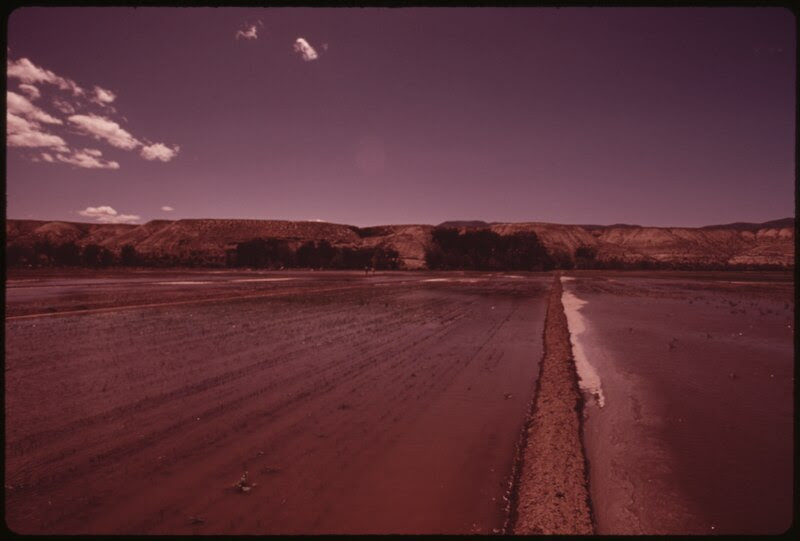
A field of young alfalfa and oats on the Pyramid Lake Indian Reservation. Field is irrigated by mechanical flooding: photo by Jonas Dovydenas for the Environmental Protection Agency Project DOCUMERICA, June 1973 (US National Archives)
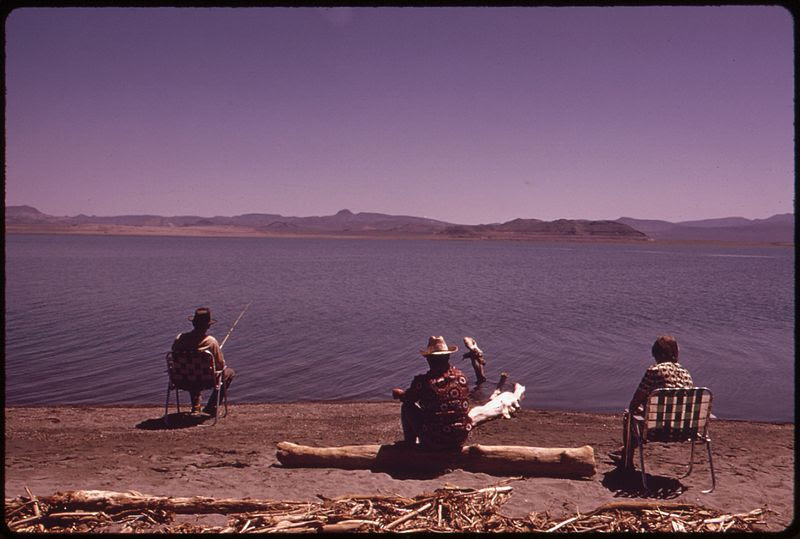
Paiute Indian fishermen at Pyramid Lake, center of the Pyramid Lake Indian Reservation: photo by Jonas Dovydenas for the Environmental Protection Agency Project DOCUMERICA, May 1973 (US National Archives)
Man-painted rock, found on a rise at the south end of Pyramid Lake, blends into the natural landscape: photo by Jonas Dovydenas for the Environmental Protection Agency Project DOCUMERICA, June 1973 (US National Archives)

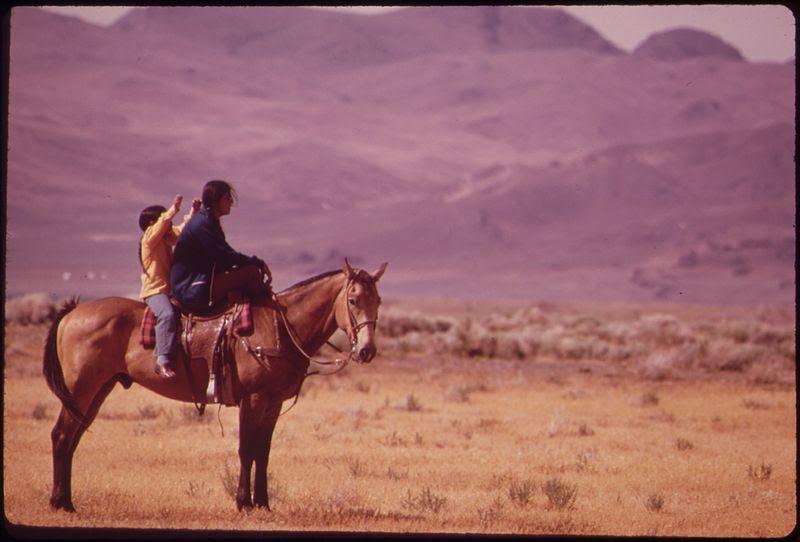





Thank you, Tom, for the good poem and instructive photographs. Just northwest of Fallon, Nixon... on a patch of hard-hard-hard luck. Used to drive through a couple times a year. Bleak town, Nixon, on a largely neglected rez. I used to stop at that Nixon convenience store for a bottle of Coke. Yeah... a great poet, Adrian C. Louis, represents that world.
ReplyDeleteThanks Red. Nothing like the local knowledge.
ReplyDeleteThe long struggle of the Paiute tribe to save their lake is perhaps best told in Knack and Stewart's As Long as the River Shall Run.
I'm going to present a bit of that text here, hopefully as a teaser for those who'd wish to follow up:
___
The injustices with Anglo-European history has heaped on the Paiutes are not safely relegated to the past. Their history, as with the history of all Indian tribes, did not stop with the shooting. The damage done to Indian peoples did not end with white settlement of the frontier. Instead it began. As Anglos increased in numbers, so increased the pressure against remnant Indian resources. The open violence of frontier times was transformed into the more subtle, and more invidious, methods of the twentieth century -- lobbying, corporate power plays, manipulation of legislative processes, government development projects, with the intricacies of legal title and contracts.
Attacks on the Pyramid lake resource base were made farther and farther from the lake itself, unseen by but not unknown to the residents there.
The Paiutes were vulnerable to this form of attack. Like Indian tribes everywhere, they were themselves politically powerless. A people few in number and despised, they had no direct access to the political system which ruled their lives. In addition, they suffered the institutionalized disadvantages which Indians alone of all ethnic groups endure. The most obvious of these was administration by the Bureau of Indian Affairs and the federal trust status of reservation land. This was an ambiguous relationship which was both a source of endless frustration and the only bulwark between the tribe and Anglo greed.
-- from As Long as the River Shall Run: An Ethnohistory of Pyramid Lake Indian Reservation: Martha C. Knack, Omer Call Stewart, 1999
By the by, considering that Jonas Dovydenas was able to pick out and represent with some measure of objectivity the basic issues and oppositions in this particular slice of regional history (in particular the history of water management in the Truckee River watershed), and that he was being paid to do so by the US government (during the Nixon administration, yet), one is almost tempted to inch toward the surprising conclusion that just maybe, can this be possible, we had then, somehow, a more enlightened government than we do today, when the government maintenance of private citizens' information is so thorough and far-reaching, whereas the officially-disclosed "public" information is so often scant, tilted and otherwise deficient.
ReplyDeleteJenny Dorn reminds us of Ed's visit to Nixon, in The Shoshoneans, cited in Claudia Moreno Parsons: The Long View of North American History:
ReplyDelete"In Nixon, Nevada, Dorn finds a white-owned and -occupied bar on First Nation land (known then as a reservation). Knowing this can’t be right, he talks to an Indigenous man, asking about the situation, who indicates that the bar folks are simply squatters and there wasn’t anything to be done about the situation. Dorn recounts their conversation, reporting his sense about what’s going on:
"'All life was a series of compromising effects for him, and that probably accounts for the innate hesitation of his reply. Although he didn’t say it, I could read it on his face: Whatever goes down, I won’t have any control over it and I (and my people) will have to get through it the best we can. For “get through” you might as well read “stay out of the way of it.” And I was thinking too, good God, how hopeless, it really doesn’t concern this man, he just lives his life along with it. Manifest Destiny, whether he’s heard of that or not, turns back in on him anyway, as much a domestic force as it is foreign, and the more it becomes frustrated and resisted abroad the more it turns back in, turns back into America.'"